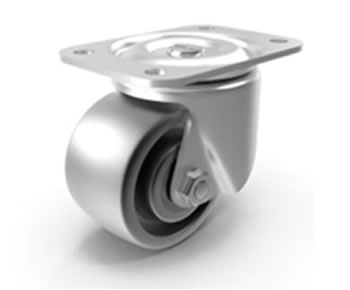Industrial Cart Casters
Casters are integral components of industrial carts, providing mobility, stability, and versatility in various industrial settings. Industrial carts are used for transporting heavy loads, materials, and equipment within factories, warehouses, and manufacturing facilities. When choosing casters for industrial carts, several factors must be considered to ensure they can withstand the demands of the industrial environment and optimize cart performance.
Types of Casters for Industrial Carts
Industrial carts may require different types of casters based on their specific applications and requirements:
- Heavy-Duty Casters: These casters are designed to support substantial weight loads, making them ideal for industrial carts carrying heavy materials or equipment.
- Swivel Casters: Swivel casters provide 360-degree rotation, allowing for easy maneuvering of carts in tight spaces, making them suitable for applications requiring precise navigation.
- Rigid Casters: Rigid casters do not swivel and provide stability and straight-line movement. They are often used in conjunction with swivel casters to create a combination of mobility and control.
- Shock-Absorbing Casters: These casters are equipped with shock-absorbing features to protect sensitive loads from impact during transportation.
Factors to Consider When Choosing Industrial Cart Casters
When selecting casters for industrial carts, consider the following factors:
- Load Capacity: Determine the weight capacity required for your industrial cart. Ensure that the selected casters can safely support the maximum load without compromising cart stability.
- Wheel Material: Choose caster wheels made from materials suitable for the industrial environment. Common options include polyurethane, rubber, and steel. Consider the type of flooring and any potential exposure to chemicals or extreme conditions.
- Wheel Diameter: The size of the caster wheels affects load distribution and maneuverability. Larger wheels are better for rough terrain and uneven surfaces, while smaller wheels offer precise control.
- Mounting Style: Determine whether your industrial cart requires stem-mounted or plate-mounted casters, based on the cart's design and construction.
- Brakes and Locking Mechanisms: Depending on your application, consider casters with appropriate braking or locking mechanisms to secure the cart in place when needed.
Benefits of Quality Industrial Cart Casters
Investing in high-quality casters for industrial carts offers several advantages:
- Enhanced Mobility: Quality casters provide smooth and effortless movement of industrial carts, improving overall efficiency and productivity.
- Load Handling: Heavy-duty casters ensure reliable load handling, preventing damage to both the cart and its contents.
- Durability: High-quality casters are built to withstand the rigorous demands of industrial environments, reducing the need for frequent replacements.
- Safety: Casters with locking mechanisms enhance cart safety, preventing unintended movement in busy industrial settings.
Installation and Maintenance
Properly install the industrial cart casters following the manufacturer's instructions to ensure safety and performance. Regular maintenance, including cleaning and lubrication, is crucial to extend the casters' lifespan and optimize their performance.
Choosing the right casters for industrial carts is essential to ensure smooth and efficient material handling in industrial settings. Evaluate your specific needs and the factors mentioned above to make informed decisions when selecting casters for industrial carts.










